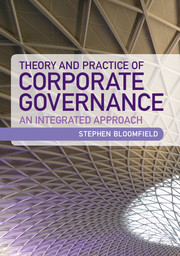Book contents
- Frontmatter
- Contents
- List of Figures and Tables
- Introduction
- Part 1 The Discipline of Governance
- Part 2 The Relationship between Law and Governance
- Part 3 Governance and the Listed Company
- Part 4 Governance and Regulation
- Part 5 Counter-governance: Failures of governance and corporate failure
- Chapter 15 Counter-governance (1): theory
- Chapter 16 Counter-governance (2): abuse of stakeholders
- Chapter 17 Concluding remarks
- Bibliography
- Index
- References
Chapter 15 - Counter-governance (1): theory
from Part 5 - Counter-governance: Failures of governance and corporate failure
Published online by Cambridge University Press: 05 March 2013
- Frontmatter
- Contents
- List of Figures and Tables
- Introduction
- Part 1 The Discipline of Governance
- Part 2 The Relationship between Law and Governance
- Part 3 Governance and the Listed Company
- Part 4 Governance and Regulation
- Part 5 Counter-governance: Failures of governance and corporate failure
- Chapter 15 Counter-governance (1): theory
- Chapter 16 Counter-governance (2): abuse of stakeholders
- Chapter 17 Concluding remarks
- Bibliography
- Index
- References
Summary
This chapter, and the next, will cover issues of ‘counter-governance’ – those activities knowingly undertaken, usually by managers, which work against the effective governance of a company.
Chapter 15 includes an examination of the following issues:
instances of failure of both procedural and behavioural governance;
structural governance failure as a cause of corporate collapse;
the development of counter-governance cultures;
‘innocent’ failure;
the legal view of corporate failure;
ethics and governance;
the two ethics view: bluff and knowing misrepresentation.
Chapter 16 looks at particular instances of counter-governance in the form of some sort of abuse of other stakeholders’ interests
market abuse: cartels;
market abuse: concealment of information;
other forms of abuse: environmental crime;
other forms of abuse: pension funds.
Introduction
The term ‘counter-governance’ is used to denote the negative aspects of governance that bring about failure to secure the objectives for which most companies are presumably established – that is, the creation of wealth for the shareholders (and, to a lesser extent, the stakeholders). It encompasses issues such as corporate insolvency; corporate criminality; market abuse; concealment or manipulation of information by managers; corrupt practices; environmental crime; pension fund abuse; and avoidance of taxation that verges on evasion by virtue of its artificial or elaborate nature. All of these will be dealt with (some in re-capitulation) in this chapter.
- Type
- Chapter
- Information
- Theory and Practice of Corporate GovernanceAn Integrated Approach, pp. 345 - 363Publisher: Cambridge University PressPrint publication year: 2013



